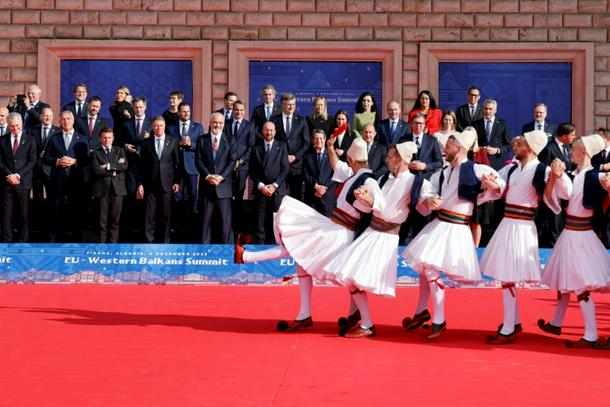
War in Ukraine has reinvigorated moves to boost ties between the EU and Western Balkans
Tirana (AFP) - European Union leaders vowed on Tuesday to strengthen ties with the Western Balkans, a drive reinvigorated by Russia’s war on Ukraine.
The war has underscored the importance for the EU of bringing the Balkans into its orbit, to stabilise the region and counter the influence there of both Russia and China.
“The future of our children will be safe and more prosperous with the Western Balkans within the EU, and we are working very hard in order to make progress,” EU Council president Charles Michel told reporters as he arrived at a meeting in Tirana of EU and Balkan leaders.
The summit was called to discuss requests by six states – Albania, Bosnia, Montenegro, Kosovo, North Macedonia and Serbia – to join the 27-nation EU and examine areas where they can cooperate.
The Balkan bids to join the EU “have gained momentum again”, said Ursula von der Leyen, the president of the EU’s executive arm, the European Commission.
She urged the Balkan nations to choose camps.
“Russia is trying to exert influence (in the Western Balkans). China tries to influence”, von der Leyen said.
“We (the EU) are the largest investor. We are the closest partner and that is why the discussion is also about you having to decide which side you are on, the side of democracy,” von der Leyen stressed.
Balkan countries have been stuck in the EU waiting room for years.
They have regularly expressed frustration at the long and demanding membership process, especially since the EU moved so rapidly this year to accept Ukraine and Moldova as official candidates to join the bloc.
The EU was expected on Tuesday to confirm its “commitment to the European Union membership (prospects) of the Western Balkans” and call for negotiations to be speeded up.
- ‘Stick together’ -
Expanding the EU has again become a priority, European Commissioner Oliver Varhelyi noted on Friday.
Dutch Prime Minister Mark Rutte echoed that, saying EU and Balkan nations needed “to stick together and work together” in the face of Russia’s war on Ukraine.
In July Brussels finally began membership talks with North Macedonia and Albania, which applied in 2005 and 2014 respectively.

Traditional dancers at the EU-Balkans summit in Tirana
Negotiations have been underway for several years with Montenegro and Serbia, while in October Brussels recommended making Bosnia an official candidate.
Kosovo, the sixth would-be member, faces challenges on its path to joining the EU.
It split from Serbia in 2008 but Belgrade has not recognised its declaration of independence.
Neither, crucially, do five EU member countries – Cyprus, Greece, Romania, Slovakia and Spain.
- Solidarity and migration -
Pro-European sentiment in the Balkans could do with a boost, noted Lukas Macek of the Jacques Delors Institute in Paris.
“The pro-European camp is getting a little desperate,” he said. A show of support from Brussels could help sway public opinion.
“There is a window of opportunity to reverse the trend but it will not necessarily last very long and it must be fleshed out with something tangible,” he said.
The EU is expected in Tirana to confirm a package of subsidies worth around one billion euros (dollars) to help the Balkans weather the energy crisis triggered by the Ukraine war.
The subsidies should help attract public and private investments and raise at least 2.5 billion euros in total.
The EU is also due to sign a deal with the region’s telecom operators to reduce roaming charges between the bloc and the Balkan states in 2023 and phase them out by 2027.
And it will also examine ways of cooperating on security issues, particularly on preventing the kind of cyber attacks that have plagued the Balkans.
Illegal migration remains a key concern.
The dangerous “Balkans route” is one of the main conduits used by millions of would-be asylum seekers, many from conflict zones, to try and reach Western Europe.
The numbers arriving by this route rose by almost 170 percent in the first 10 months of 2022 compared to last year. That spike prompted the Commission on Monday to propose sending the EU border force Frontex to help police the Balkan borders.
The EU, for its part, wants Balkan countries to align their visa policies with its own.
Serbia has been accused of contributing to an increase in the number of migrants from Cuba, Burundi, India and Tunisia entering the EU.
These nationals can arrive at Belgrade airport without a visa and then continue their journey to the bloc by land.
Under EU pressure, Serbian President Aleksandar Vucic has announced an end to visa exemptions for Tunisians and Burundians.